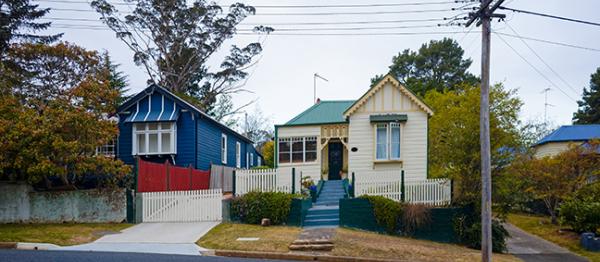27 January 2022
Not-so-obvious things to consider when buying a house
We’re here to help with some useful things to consider on the journey to getting into your first home.

Making what is often a life-changing commitment sounds overwhelming - don’t worry, you’re not alone in thinking that! Thankfully, there’s never been a better time to research, with information readily available at your fingertips. The more informed you are, the more comfortable you’re going to be with the decision.
We’re here to help with some useful things to consider on the journey to getting into your first home.
Grants
Let’s start with dollars. For most of us, every single one will count when it comes to a deposit, and there might be some help out there for you in the form of the First Home Owner Grant scheme*. It’s a national initiative administered by the states and territories, and a one-off payment is available to first-home owners that satisfy eligibility criteria, which varies from state to state:
New South Wales
A payment of $10,000 is available to go towards the purchase of a new home (ie, one that nobody has lived in before), providing the property is worth no more than $750,000 and it’s the first home you or your spouse have owned or co-owned in Australia.
In addition, a full or partial exemption on transfer duty (previously known as stamp duty is available for new or existing properties worth up to $1,000,000, providing it’s your first home.
Victoria
It’s a similar story in Victoria, with $10,000 available if you’re building or buying a new home valued up to $750,000.
There’s also exemptions and concessions available on transfer duty. For properties worth up to $600,000 that’s a one-off total exemption, and for those valued between $600,000 and $750,000 a partial concession is available.
For some eligible Victorians, there’s also the Victorian Homebuyer Fund, which could provide a contribution of up to 25% towards the purchase price of a property, allowing you to obtain a loan with a deposit as low as 5 percent while still avoiding the need to pay Lenders Mortgage Insurance (LMI).
It’s known as a shared equity scheme - meaning the government takes a temporary share, or proportional interest, in the property while you repay their contribution.
Queensland
If you’re building or buying a new home things are slightly rosier in Queensland, with the First Home Owners’ Grant bumped up to $15,000. Again, it’s a similar situation to New South Wales and Victoria - the house must be new, valued at no more than $750,000 and you or your spouse must not have previously owned property in Australia.
For Queenslanders who can afford to build or buy a home but are unable to get private finance from a bank or building society, the Queensland Housing Finance Loan - essentially a loan from the Queensland Government - might be able to help.
South Australia
First home buyers may be eligible for a grant of up to $15,000 for new homes that will be their principal place of residence. Properties must be valued at $575,000 or less, and the usual eligibility criteria applies for applicants.
Western Australia
A one-off First Home Owner Grant of $10,000 is available for eligible first home buyers to buy or build a new residential property for use as their principal place of residence. Interestingly, substantially renovated may be considered a new home.
For those eligible purchasing an established home, a concessional first home owner rate of duty may be applicable. If the dutiable value of the home is less than $430,000 no duty is payable, while properties valued at up to $530,000 may be entitled to a partial concession.
Tasmania
In Tasmania, the First Home Owner Grant is an eye-popping $30,000, available to eligible applicants that purchase or build a new home between 1 April 2021 and 30 June 2022.
For existing properties, concessions and exemptions are available on property transfer duty for first home buyers.
Australian Capital Territory
In the ACT the FHOG has been replaced by the Home Buyer Concession Scheme, which allows eligible first home buyers to pay no or reduced duty on any new or existing residential property, regardless of the price.
Northern Territory
A First Home Owner grant of $10,000 may be available in the Northern Territory if you are buying or building a new home. If it’s a new home, you might also be eligible for up to $2,000 to purchase household goods as part of the Household goods grant scheme.
Easements
When purchasing or building a home, it might seem that land is essentially yours - but others still might have some access rights over that land. Let’s talk about easements.
An easement is a section of land registered on your property title that gives another person the right to use or access that part of your property. The type and nature of these easements can vary, and could restrict your ability to build or develop the land in future. Some will have little bearing on your decision to buy, but others might be a serious red flag.
A common example is a carriageway, or right-of-way easement, such as a shared driveway on a battleaxe block where road access is restricted. While that carriageway exists, you won’t be able to do anything with that land.
An easement for services is also common. This type of easement exists so that essential services - such as electricity, gas, sewerage or gas - can be accessed to repair, maintain or report.
The location of easements are also important to consider. An easement that runs along the rear boundary of your property, for example, might not have much impact on any future development plans but an easement running diagonally across your property most certainly will. An easement of support is similar, but requires excavation (such as telephone lines, electricity lines and drainage pipes).
Easements of light and air may restrict the building of walls or buildings if they negatively impact your neighbour’s views, while cross easements occur when neighbouring properties share a ‘party wall’, most commonly in terrace houses.
The legislation around easements can be complex for the uninitiated, and can vary from state to state. Help from a good conveyancer or lawyer is important here. Before purchasing a property, they will be able to determine if any easements are registered on the title, and to what extent those easements could impact your use of the land.
Proximity to Transport
If you’re in a capital city, proximity to public transport is likely going to factor into where to buy.
Access to public transport - especially rail services - has been found to positively impact quality of life via a range of different factors, including access to different activities and services, and overall satisfaction with travel.
There might be economic benefits down the line - a University of NSW study found the impact of rail transit on property prices is significant, with residential prices rising the closer properties were to the nearest station.
In other situations the ability of active travel will be an attractive factor for first home buyers, as urban planning continues to open up inner cities for walking and cycling.
Noise Pollution
Noise pollution can have a major impact on your health and wellbeing.
A World Health Organisation (WHO) report in 2011 found exposure to prolonged or excessive noise can cause a range of health problems ranging from stress, poor concentration and fatigue from lack of sleep, right through to more serious issues like cardiovascular disease, hearing loss and cognitive impairment. What’s more, it may be sounds we’re not even aware we’re hearing that affect us the most, especially when we’re asleep.
Traffic sounds will be the most important source of noise pollution to consider when looking for a home. Be aware of highways, airports and train lines in particular, as well as industrial areas and construction sites. And while living in an area with a vibrant nightlife has plenty of upsides, think about what that might mean even when you’re not out and about.
The best way to get all of this information, put simply, is to put your own ear to the ground. If you can, inspect the house or block of land at various times and days of the week. The relative serenity of a relaxed Saturday morning open house might be a completely different proposition during peak hour on a Monday.
And once you have your very own slice of paradise, don’t forget to properly protect it with home and contents insurance.
(*All information is correct at the time of publishing, but grants for new home buyers often change, and so you’re best to double check the criteria yourself.)
This content is intended to be general in nature and is not financial or professional advice. We recommend you obtain independent professional advice relevant to your circumstances, before making any financial or commercial decisions.



